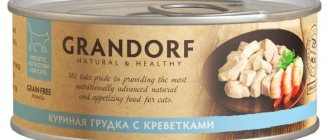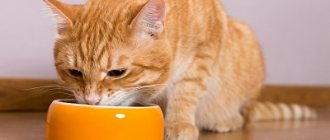What kind of fish can you give your cat?
Fish should not be fed without pre-treatment:
- The heads and fins are cut off and the scales are removed.
- If you plan to feed it raw, it should be frozen for a week.
- When cooking, do not add salt, pepper, or seasonings.
- The prepared product is disassembled into pieces, the bones are removed, fed separately or mixed with chopped vegetables and porridge in a ratio of 3 to 1.
- Before serving, bring to room temperature: cool or defrost.
Representatives of salmon and cod are more suitable for feeding cats:
Keeping a cat on one fish is harmful, despite the undeniable benefits.
Why fish can be dangerous
With constant feeding, excess minerals and harmful components accumulate in the body:
- Excess magnesium and phosphorus are not absorbed and are deposited in the kidneys, which is why KSD develops.
- Histamine in the protein accumulates and provokes allergic reactions. The animal develops itching, dandruff, and hair loss.
- The enzyme thiaminase destroys thiamine, which disrupts metabolic processes.
- Excess fatty acids against the background of tocopherol deficiency provoke inflammation of adipose tissue and the development of panniculitis.
- The fish component trimethylamine oxide interferes with the absorption of iron, which leads to anemia.
- Cats do not absorb vitamin K from fish. It is responsible for blood clotting, so the animal runs the risk of dying from internal hemorrhages.
- Excess iodine leads to the development of hyperthyroidism, and the functions of the thyroid gland are disrupted.
- Wild marine and river species are parasitized by helminths. When they enter the intestine, they pass through the walls and migrate with the bloodstream throughout the body.
The composition of fish depends on the environment. Chemicals and metal salts are found in wild specimens; antibiotics and hormones are found in farm specimens; they are added to accelerate growth and prevent diseases.
What fish should you not feed your cat?
Cats are prohibited:
- Waste . Heads and bones injure the esophagus, larynx, get stuck in the intestines, and do not carry anything useful. They have little calcium.
- Salty . Excess salt is deposited in the bladder and kidneys, which provokes the development of urolithiasis.
- Smoked . Contains carcinogens and allergens. Helminths are not destroyed by smoking.
- Canned fish . Seasonings, salt, and spices disrupt metabolism.
- Fried . Excessive fat disrupts the functioning of the pancreas and liver. Calorie content increases by 2–3 times.
- Sun-dried, dried . The fish is sprinkled with salt or soaked in a saline solution, so the final product is unsuitable for cats.
The table lists the fish varieties that should not be given:
Fish for cats - examples of what is and is not possible
Most cat owners sooner or later face the question of whether they can give their furry pet fish. Cats belong to the category of carnivores. According to their physiological needs, the diet should contain dishes that enrich the body with proteins and fats. In addition, the animal requires the intake of the amino acid arginine, aminosulfonic and arachidonic acids. The listed substances help to establish metabolism in the mustachioed body and restore the normal functioning of internal organs.
Fish contains a high percentage of phosphorus. If you often feed your animal fish delicacies, there is a risk of triggering the development of urolithiasis. However, most veterinarians believe that not all pets are susceptible to this disease, but only those with weak immunity. The information presented below will help you figure out whether fish for cats will be harmful or beneficial to the body.
A fish delicacy for a pet can both strengthen and weaken the immune system.
Individual reactions
Any industrial feed is a multi-component product. And sometimes it happens that one of the components causes an individual undesirable reaction in a cat (food intolerance, allergy). When you use both dry food and canned food, it will be doubly difficult to understand the reasons for this phenomenon.
If your pet is prone to allergies or has sensitive digestion, it is better not to experiment with its diet again.
For those who still decide to feed their cat dry food and canned food at the same time, it is important to adhere to the following rules:
- do not introduce two new foods one after the other and do not mix them in one bowl, the normal adaptation time to a new food is 7-10 days;
- Do not use products where protein sources are named in general terms, because it may turn out that some “meat products” include chicken, to which your cat is allergic.
The need for fish for cats
Can cats fish and is it necessary to include this delicacy in your pet’s diet? Veterinary experts believe that the menu for four-legged friends can include boiled marine fish. Before cooking the product, you need to separate all the bones to avoid injury to the animal’s larynx and esophagus.
Can a neutered cat eat fish?
Why can't cats fish? It is believed that after castration the risk of developing bladder stones increases. Poor nutrition can contribute to the development of a dangerous pathology. However, some veterinary experts believe that it is still possible to occasionally give fish delicacies in small quantities to pets who have undergone the castration procedure.
Note! The presence of fish in the diet of animals does not in any way affect the risk of urolithiasis, despite the fact that the product contains a large percentage of phosphorus, which creates conditions for the formation of struvite in the bladder area.
Fish for a sterilized cat
Why can't cats be fed fish? Cats that have been neutered should not eat this product frequently. Scaly ones can only be in a pet’s diet as a rare treat. Although, if possible, it is better to avoid such a product.
Important! Under no circumstances should you give raw products, as this risks, at a minimum, infection with helminthiasis. If you want to give your cat a fish, you should give preference to marine varieties that will do more good than harm. All dice must be pre-selected.
Is it possible to give canned food?
Super-premium canned food, which is prepared for fluffy purrs, does not contain harmful substances. Among the main ingredients of the products, there are a large number of natural elements, minerals and vitamins that can help restore the health of the animal and compensate for their deficiency in the body. However, when choosing canned food, you should pay attention to quality. Of course, not every owner has the opportunity to purchase ready-made holistic food, but a super-premium diet is available to the majority of consumers.
Important! Fish, like milk, should rarely be present in the diet of animals.
What kind of fish to give: raw or boiled
It is important to pay attention not only to the type of fish, but also to the method of its preparation. It is unacceptable to give your pets whole fish raw. It is worth considering that not every part is digested by the four-legged friend’s body in the same way. In addition, raw fish can cause the development of helminthiasis. Cat owners who introduce raw food into their cat's daily diet can cause a deficiency of vitamin B1 in the body. If a cat eats raw fish systematically, its health will undoubtedly worsen.
Sample menu of natural products
To make the owner’s life easier, they are developing a sample menu for 1 week:
- First day. For breakfast, a small amount of low-fat cottage cheese. For lunch, chicken soup with some vegetables added. You can grind everything in a blender. For dinner milk or kefir.
- Second day. For breakfast, cottage cheese with the addition of yogurt. For lunch they serve meat stew with the addition of vegetables. For dinner - fermented baked milk.
- The third day. Breakfast – chicken pate. Lunch – offal with cereal. Dinner: low-fat yogurt.
- Fourth day. Breakfast – low-fat cottage cheese. Lunch: liver with broccoli. Dinner – chicken soup.
- Fifth day. Breakfast - meat soup with semolina and yolk. Lunch - milk. Dinner – chicken pate.
- Sixth day. Breakfast – fresh or boiled fish. Lunch – beef cutlet. Dinner - milk.
- Seventh day. Breakfast – ground chicken fillet with added vegetables. Lunch – cottage cheese ice cream. Dinner – chicken puree soup with broccoli.
Attention! If your pet has diseases of the internal organs, it is advisable to choose natural cat food that is low in fat. This reduces the load on the liver and digestive tract.
Some pets may have allergies. Then the veterinarian prescribes a balanced diet that excludes the presence of antigens. For example, some cats may be allergic to chicken. Then they use rabbit, veal, beef.
If a person gets a kitten, a natural cat kit is also used for it. It is better not to use beef, as its meat is very tough. You can use veal, chicken or rabbit. The meat is boiled for a long time until it becomes soft. Dairy products are introduced gradually so as not to cause diarrhea and digestive upset.
What kind of fish can you feed cats?
Not every animal owner knows which fish is healthier for a purring pet - sea or freshwater. Veterinarians advise against the second option. It is unacceptable to feed castrated pets with such fish. It is more advisable to offer your cat fillet as a fish treat:
Salmon is a healthy treat for cats
However, even such a healthy cat fish should not become the basis of the furry purr’s diet. And in this case, it doesn’t matter whether they are just planning to castrate/sterilize the pet or have already done it. The delicacy should be served in small quantities. As a rule, it is included in the cat's menu once every 6-10 days. The portion should be small. It should be borne in mind that the body of a mustachioed friend needs to obtain large amounts of fatty acids.
Often, pet owners lacking experience are interested in how much to cook blue whiting for a cat (or another type of product). After the water boils, the delicacy should simmer over low heat for about 15-20 minutes.
For your information! If it is not possible to cook the fish fillet, it should be pre-frozen (beef and chicken are prepared in the same way for fluffy purrs). The procedure should last about 24-48 hours. It is recommended to freeze only fresh products, since repeated freezing contributes to the destruction of beneficial omega-3 acid.
When choosing fish for your pet, it is important to pay attention to freshness
In order not to worry about your cat becoming infected with helminths, it is best to boil the fish fillet. Cooking will be able to destroy the harmful thiaminase enzyme contained in the composition and will not reduce the percentage of beneficial omega acids. After the fish fillet has been boiled and cooled, you should inspect it, removing bones that are not able to be digested in the animal’s body after cooking.
Note! If your pet is served fish that has been frozen, it is acceptable to leave the cartilage.
Fluffy purrs can feast on fish delicacies no more than 4-5 times a month. It is advisable to mix the sirloin with a small amount of oatmeal and chopped vegetables. The frequency of feeding castrated cats with fish products should not exceed 2 times a month. This will minimize the risk of bladder stones. If the diet contains factory-made food with fish ingredients, it is better to completely exclude the fish product from the menu of the four-legged friend, which will make it possible to avoid upset of the digestive system.
Fish is a product that can only be given to cats occasionally. However, it is very important which species is present on the animal’s menu. It’s better to avoid freshwater altogether. It is unlikely to bring any benefit, but it may well cause infection with helminths or the development of urolithiasis. For your pet to live for many years, it is important to provide it with the right diet.
Eating problems
Cats fed dry food and canned food sometimes become picky eaters, which makes life very difficult for the owner. The fact is that food saturated with moisture is always more aromatic and attractive than dry granules. As a result, the cat ignores the full bowl of food, but follows the owner on his heels, begging for his favorite treat.
If this is not part of your plans, it is better not to offer your pet canned food: dry food is enough for him. Animals do not at all need variety in the human understanding: they can eat the same thing for years without suffering from it.
The benefits and harms of a fish diet
Fish is a product that is not mandatory in the diet of cats, but is loved by animals. You can’t argue that its benefits are obvious: it contains healthy fatty acids that promote the growth of beautiful hair, stop inflammatory processes in the body, and support vascular health.
However, it is important to know about the dangers of fish when consumed in abundance. This is evidenced by a combination of reviews from cat owners, as well as the opinions of practicing veterinarians.
- Urolithiasis disease . Due to excess magnesium when consuming fish and the balance of minerals, the functioning of the kidneys of healthy pets gradually becomes more difficult, which leads to the provocation of the development of this serious disease. It is especially contraindicated in castrated and sterilized cats.
- Metabolic disorder or, in other words, oxidative stress in the body. It develops especially actively in cats that eat only raw fish.
- Overweight. This occurs due to a lack of vitamin E and oversaturation with fatty acids. All adipose tissue of the body becomes inflamed, body temperature rises, and general lethargy appears. Sometimes even soft and gentle touches to the fur will cause pain in the cat.
- Difficult metabolism. Fish contains a lot of thiaminase, an enzyme that destroys vitamin B1, which is so necessary for pets. This enzyme can be destroyed by heat treatment or boiling the product for 30-40 minutes, but the beneficial properties are also lost.
- Anemia. Fish contains trimethylamine oxide, which does not allow iron to be absorbed in cells, therefore the development process of the animal slows down and leads to infertility.
- Hyperfunction of the thyroid gland. This disease develops in cats that consume fish products every day and in unlimited quantities.
- Excess fish in the diet leads to a lack of vitamin K, which is responsible for blood clotting. For this reason, very often animals die in case of hemorrhage in the gastrointestinal tract and liver.
- Infection with helminths . As is known, fish are carriers of parasite larvae that can infect pets.
- This product is also a strong allergen and can provoke the development of allergic reactions.
- Pets often injure the esophagus and intestines with sharp bones.
Against the backdrop of all the dangers that await our pets when eating fish, the benefits are lost. Before you diversify your cat's menu with his favorite delicacy, you should think about the consequences.
What you need to know about canned food
Canned food was invented by mankind in order to preserve food supplies for as long as possible, for example, during travel or military campaigns. It is clear that this product is intended to lead to a feeling of satiety, and not to saturate the body with nutrients as much as possible. Although not the healthiest product, canned food perfectly serves the function of preserving food for the required moment.
Regarding their effect on the cat’s body, it should be noted that all of the above applies to canned food consumed by humans.
But there are special canned food for cats . They contain many specially added beneficial substances and can be fed to your domestic cat all the time without fear for its health. These canned foods are created for the daily diet of pets.
This product was specifically developed for these animals; all their needs were taken into account during production, so consumption will not irritate the intestinal mucosa.
These canned foods also have an appetizing aroma, which instinctively attracts animals to them.
Another significant advantage is that this method of feeding domestic cats is ideal for busy people.









